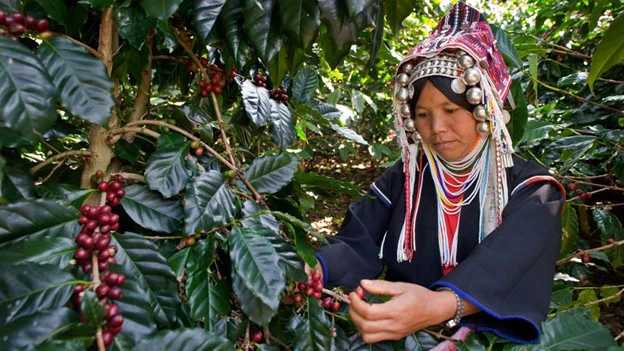
P.C.: BBC
Trendy cafes owned by expert baristas at the sidewalk of the city area to wobbly coffee carts at every ten steps, it is hard not to get entwined in the intoxicating aroma of coffee in Thailand.
Although Thailand is relatively a young player in the coffee industry, today, it has become one of the leading producers of coffee in the world. Producing 42,000 metric tons (93,000,000 pounds) of coffee means Thailand supplies the world with about 0.4% of its coffee.
It all started in the 1970s, when coffee in the northern border region, along with Burma and Laos (The golden triangle), was introduced as a cash crop by the royal family of Thailand to replace opium poppies. Thai/United Nations Crop Replacement and Community Development Project initiated experimentation of replacing opium with coffee cultivation.
Since then, the mass production and high yield have helped improve livelihoods and build more public facilities, such as schools and hospitals in the community.
Commonly renowned as the coffee capital of Thailand, Chiang Mai is the home of the Royal Coffee Research Centre and Arabica Association of Thailand.
Two types of coffee are produced, specifically, arabica in the Chiang Mai province in northern Thailand and Robusta in the southern parts of Thailand. The Arabica coffee plant thrives in areas of heavy rainfall and higher elevations, so the hill tribes of Thailand are ideal for producing it.
In previous years, Robusta was known as the main coffee bean in Thailand, but nowadays, Thailand’s farming focuses on the more exportable Arabica beans. Arabica is more popular because of the sweeter and smooth flavours and is now more common in coffee shops.
As the coffee industry began to thrive in Thailand, some larger corporations began to exploit – the land and farmers. However, direct and fair trade gained popularity, and more and more people began to see its benefits. Direct and fair trade helped the local farmers receiving a wage appropriate to their work. (Source)
The excellent quality of coffee, produced today alongside the culture of sustainability, has resulted in Thailand, emerging as one of the leading countries for coffee production in Asia.

Oliang (Thai Iced Coffee), P.C.: Thai Food Online.
Despite the presence of the major worldwide coffee chains, such as Starbucks across the country, the independent cafés in Bangkok and Chiang Mai are cherished by the Thai people.
Whether it is iced coffees mixed with condensed milk, small espresso Nescafe cans or a straight-up cappuccino, the coffee scene is very much an integral element of Thainess.